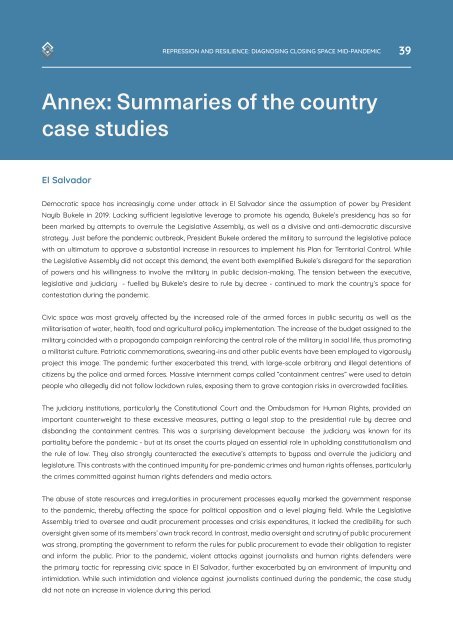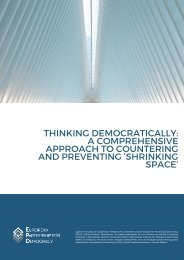Repression and resilience: Diagnosing closing space mid-pandemic
You also want an ePaper? Increase the reach of your titles
YUMPU automatically turns print PDFs into web optimized ePapers that Google loves.
REPRESSION AND RESILIENCE: DIAGNOSING CLOSING SPACE MID-PANDEMIC<br />
39<br />
Annex: Summaries of the country<br />
case studies<br />
El Salvador<br />
Democratic <strong>space</strong> has increasingly come under attack in El Salvador since the assumption of power by President<br />
Nayib Bukele in 2019. Lacking sufficient legislative leverage to promote his agenda, Bukele’s presidency has so far<br />
been marked by attempts to overrule the Legislative Assembly, as well as a divisive <strong>and</strong> anti-democratic discursive<br />
strategy. Just before the p<strong>and</strong>emic outbreak, President Bukele ordered the military to surround the legislative palace<br />
with an ultimatum to approve a substantial increase in resources to implement his Plan for Territorial Control. While<br />
the Legislative Assembly did not accept this dem<strong>and</strong>, the event both exemplified Bukele’s disregard for the separation<br />
of powers <strong>and</strong> his willingness to involve the military in public decision-making. The tension between the executive,<br />
legislative <strong>and</strong> judiciary - fuelled by Bukele’s desire to rule by decree - continued to mark the country’s <strong>space</strong> for<br />
contestation during the p<strong>and</strong>emic.<br />
Civic <strong>space</strong> was most gravely affected by the increased role of the armed forces in public security as well as the<br />
militarisation of water, health, food <strong>and</strong> agricultural policy implementation. The increase of the budget assigned to the<br />
military coincided with a propag<strong>and</strong>a campaign reinforcing the central role of the military in social life, thus promoting<br />
a militarist culture. Patriotic commemorations, swearing-ins <strong>and</strong> other public events have been employed to vigorously<br />
project this image. The p<strong>and</strong>emic further exacerbated this trend, with large-scale arbitrary <strong>and</strong> illegal detentions of<br />
citizens by the police <strong>and</strong> armed forces. Massive internment camps called “containment centres” were used to detain<br />
people who allegedly did not follow lockdown rules, exposing them to grave contagion risks in overcrowded facilities.<br />
The judiciary institutions, particularly the Constitutional Court <strong>and</strong> the Ombudsman for Human Rights, provided an<br />
important counterweight to these excessive measures, putting a legal stop to the presidential rule by decree <strong>and</strong><br />
disb<strong>and</strong>ing the containment centres. This was a surprising development because the judiciary was known for its<br />
partiality before the p<strong>and</strong>emic - but at its onset the courts played an essential role in upholding constitutionalism <strong>and</strong><br />
the rule of law. They also strongly counteracted the executive’s attempts to bypass <strong>and</strong> overrule the judiciary <strong>and</strong><br />
legislature. This contrasts with the continued impunity for pre-p<strong>and</strong>emic crimes <strong>and</strong> human rights offenses, particularly<br />
the crimes committed against human rights defenders <strong>and</strong> media actors.<br />
The abuse of state resources <strong>and</strong> irregularities in procurement processes equally marked the government response<br />
to the p<strong>and</strong>emic, thereby affecting the <strong>space</strong> for political opposition <strong>and</strong> a level playing field. While the Legislative<br />
Assembly tried to oversee <strong>and</strong> audit procurement processes <strong>and</strong> crisis expenditures, it lacked the credibility for such<br />
oversight given some of its members’ own track record. In contrast, media oversight <strong>and</strong> scrutiny of public procurement<br />
was strong, prompting the government to reform the rules for public procurement to evade their obligation to register<br />
<strong>and</strong> inform the public. Prior to the p<strong>and</strong>emic, violent attacks against journalists <strong>and</strong> human rights defenders were<br />
the primary tactic for repressing civic <strong>space</strong> in El Salvador, further exacerbated by an environment of impunity <strong>and</strong><br />
inti<strong>mid</strong>ation. While such inti<strong>mid</strong>ation <strong>and</strong> violence against journalists continued during the p<strong>and</strong>emic, the case study<br />
did not note an increase in violence during this period.

















